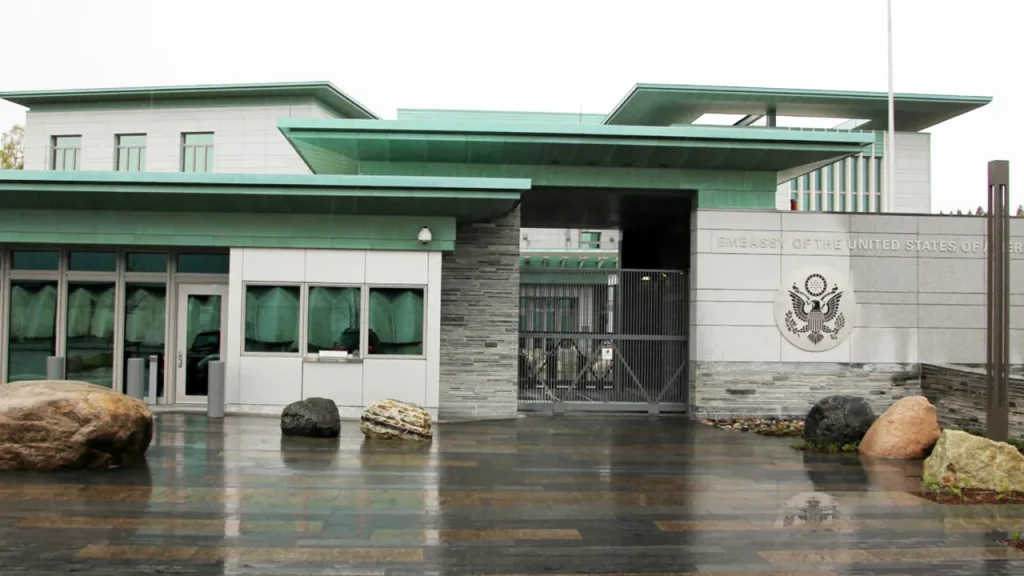From Embassy Security to Spy: The Complex Case of a Norwegian Man’s Espionage Conviction
In a striking case that raises questions about the boundaries of espionage law and the vulnerabilities of diplomatic facilities, a 28-year-old Norwegian former security guard at the U.S. Embassy in Oslo has been sentenced to three years and seven months in prison for spying on behalf of Russia and Iran. The case, which has unfolded since his arrest in November of last year, reveals a complex story of deception, misrepresentation, and international intrigue. The man, whose identity remains protected under Norwegian law, was found guilty of five espionage-related charges, though he was acquitted of gross corruption. While acknowledging the basic facts presented in the indictment, he has maintained his innocence of criminal wrongdoing, creating a tension between admitted actions and disputed intent that sits at the heart of this unusual case.
According to prosecutors, the former embassy security guard shared sensitive information with foreign agents, including details about U.S. diplomats, embassy floor plans, and security procedures. Norwegian state broadcaster NRK reported that the man’s actions were apparently motivated by concerns over American ties to Israel and the conflict in Gaza, which prompted him to reach out to representatives from both Russia and Iran. This political motivation adds a layer of complexity to the case, suggesting that the defendant may have been driven less by financial gain than by ideological concerns about U.S. foreign policy. At the time of his arrest, the young man was pursuing a bachelor’s degree in security and preparedness at Norway’s Arctic University, creating a troubling juxtaposition between his educational focus on security matters and his alleged betrayal of security protocols.
The defense team has painted a markedly different picture of the situation, arguing that their client’s actions fall short of what should legally constitute espionage. Attorney Inger Zadig of Elden Law Firm emphasized that the defendant had misrepresented his position and access level to foreign agents, claiming security clearances he did not possess and exaggerating his role within the embassy. “He had roughly the same level of access as a janitor at the embassy,” Zadig stated, suggesting that the information shared was effectively worthless and incapable of causing harm to individuals or state security interests. This defense raises important questions about the threshold for espionage charges: Does the sharing of low-value or publicly available information with hostile actors constitute a serious security breach, or is intent and potential for harm the more appropriate measure?
The case has unfolded against the backdrop of increasing international tensions and heightened concerns about foreign interference in diplomatic missions worldwide. The U.S. State Department has not publicly commented on the matter, maintaining a notable silence that may reflect the sensitive nature of embassy security concerns or ongoing intelligence operations. The conviction highlights the vulnerabilities that embassies face not just from sophisticated foreign intelligence operations but also from insider threats posed by support staff with even limited access. As diplomatic facilities around the world grapple with complex security challenges, this case serves as a reminder that threats can emerge from unexpected quarters, including from individuals with seemingly peripheral roles within the security infrastructure.
The Norwegian legal system’s handling of the case reflects the serious approach that Western democracies are taking toward espionage and foreign interference in the current geopolitical climate. The prison sentence of three years and seven months signals that even “low-level” espionage is viewed as a significant threat to national and international security interests. However, the defendant’s legal team has indicated they may appeal the verdict, suggesting that the final chapter in this story has yet to be written. The case raises broader questions about how democratic societies balance security concerns with legal rights and proportional punishment, particularly in cases where the actual harm caused may be difficult to quantify or where motivations may be political rather than financial.
Beyond the specifics of this individual case, the conviction highlights the evolving nature of espionage in the 21st century. Traditional notions of spycraft involving classified documents and secret codes now exist alongside a more diffuse concept of information gathering that can include seemingly innocuous details about diplomatic personnel, building layouts, and institutional routines. As the lines between public and private information blur in our interconnected world, and as geopolitical tensions drive increased intelligence gathering efforts by state actors, countries like Norway and their international partners face the challenging task of defining, detecting, and deterring espionage activities that may take increasingly subtle forms. This case serves as a sobering reminder that in the modern security landscape, threats can emerge from within as well as without, and that the human element remains both the greatest strength and the most significant vulnerability in any security system.


